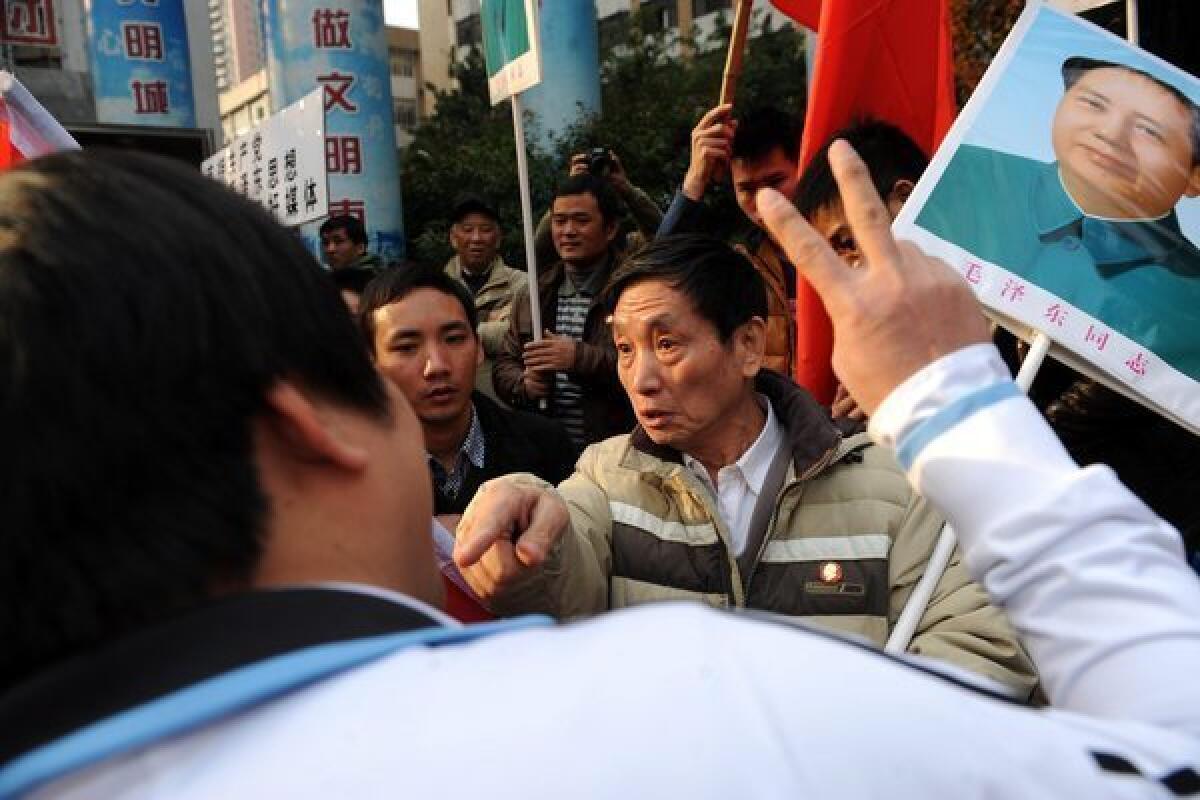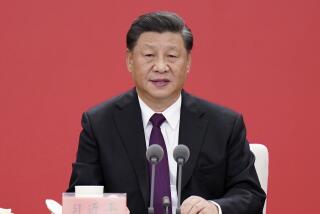Chinese news organizations rally behind censored paper

- Share via
This post has been corrected. See the note at the bottom for details.
GUANGZHOU, China -- In a rare show of defiance to China’s censors, news organizations around the country rallied behind colleagues at the maverick Southern Weekly who are threatening to strike over press censorship.
At least four prominent newspapers disobeyed orders on Tuesday to publish an editorial attacking the Southern Weekly journalists. Others published the editorial with a disclaimer saying it did not represent their views. News portals artfully arranged headlines so that the first Chinese character in each line spelled messages like “Go Southern Weekly!”
Shouting matches broke out Tuesday between hardliners carrying photographs of Mao Tse-tung and free speech advocates who demonstrated for a second day outside the newspaper’s headquarters in Guangzhou, the capital of China’s prosperous and relatively free-wheeling southern Guangdong province.
Police interference was subdued as China’s incoming leadership appeared to be mulling its options in a delicate transition period. The protests could be the first big challenge to Xi Jinping, who became general secretary of the Communist Party in November and is trying to distinguish himself from outgoing leader Hu Jintao.
“Pro-reform people had high hopes for Xi Jinping and they are trying to test the waters,’’ said Ding Xueliang, a professor at the Hong Kong University of Science and Technology. “But I don’t think the new leadership will allow the protests to become much bigger at street level because then it will become a stability issue.”
In a sign of the rising panic in Beijing, propaganda officials late Monday ordered evening newspapers to publish a harsh editorial from the Communist Party-run Global Times condemning the Southern Weekly journalists.
“It is clear that under the reality of China’s current state of affairs, the country is unlikely to have the ‘absolutely free media,’” said the editorial, which accused foreigners of “inciting some media to engage in confrontation.”
“The Southern Weekly issue will not be concluded with a surprise ending,” the editorial stated.
At least four major newspapers, including two big-city dailies, the Beijing News and Shanghai Morning Post, declined to run the mandatory editorial. Many other newspapers placed the editorial Tuesday in their news pages rather than opinion — a subtle way of distancing themselves from the message.
The standoff began over a front-page new year’s editorial published Jan. 3 that originally called for constitutional reforms, but was rewritten by the provincial propaganda chief as a bland message of congratulation over China’s achievements. The journalists have demanded the resignation of the official, Tuo Zhen, and have threatened not to publish the next issue of the weekly newspaper, to be released Thursday.
Senior editors of the newspaper were reported huddling with top Guangdong officials Tuesday in search of a face-saving compromise for both sides. The resolution of the dispute will also be a test for the new Guangdong Province party chief, Hu Chunhua, a rising political star who many believe could succeed Xi Jinping in another decade.
Southern Weekly (better known by its Chinese name, Nanfang Zhoumo) is part of the giant Nanfang Media Group, prized for its hard-hitting investigative reporting despite the restrictions.
Outside the newspaper offices, protests on Tuesday had dwindled to a few dozen people with opposing camps trading insults and at one point scuffling with their fists.
“Support the Communist Party!” “Support Chairman Mao’s Theories!” “Crack down on Traitor Media!’’ read some of the banners, while free speech advocates denounced their critics as part of the “fifty-cent party”—a term for bloggers who are paid small amounts of money for pro-government posts.
“I believe in democracy. I want to fight for freedom of speech,” shouted a 24-year-old activist who gave his name as Yang Fengchu. “Without Southern Weekly, there is nobody to oversee the government.”
The noise was louder on the Internet, where celebrities, actors, musicians, academics and writers sent out words of encouragement to millions of followers.
“We don’t need tall buildings, but we need a newspaper that speaks the truth. We don’t need the second highest GDP in the world, but we need a newspaper that speaks the truth. We don’t need a fleet of aircraft carriers, but we need a newspaper that speaks the truth,” wrote one of China’s most famous bloggers, Li Chengpeng.
For the record, 5:50 p.m., Jan. 8: A previous version of this post referred to the Shanghai News. It has been changed to Shanghai Post.
Update: China’s propaganda chief and Southern Weekly end censorship standoff
ALSO:
Suspects appear in court in Indian rape case
Afghan leader heading to Washington for talks
India accuses Pakistani troops of killing two soldiers
Nicole Liu of The Times’ Beijing bureau contributed to this report.
More to Read
Sign up for Essential California
The most important California stories and recommendations in your inbox every morning.
You may occasionally receive promotional content from the Los Angeles Times.










